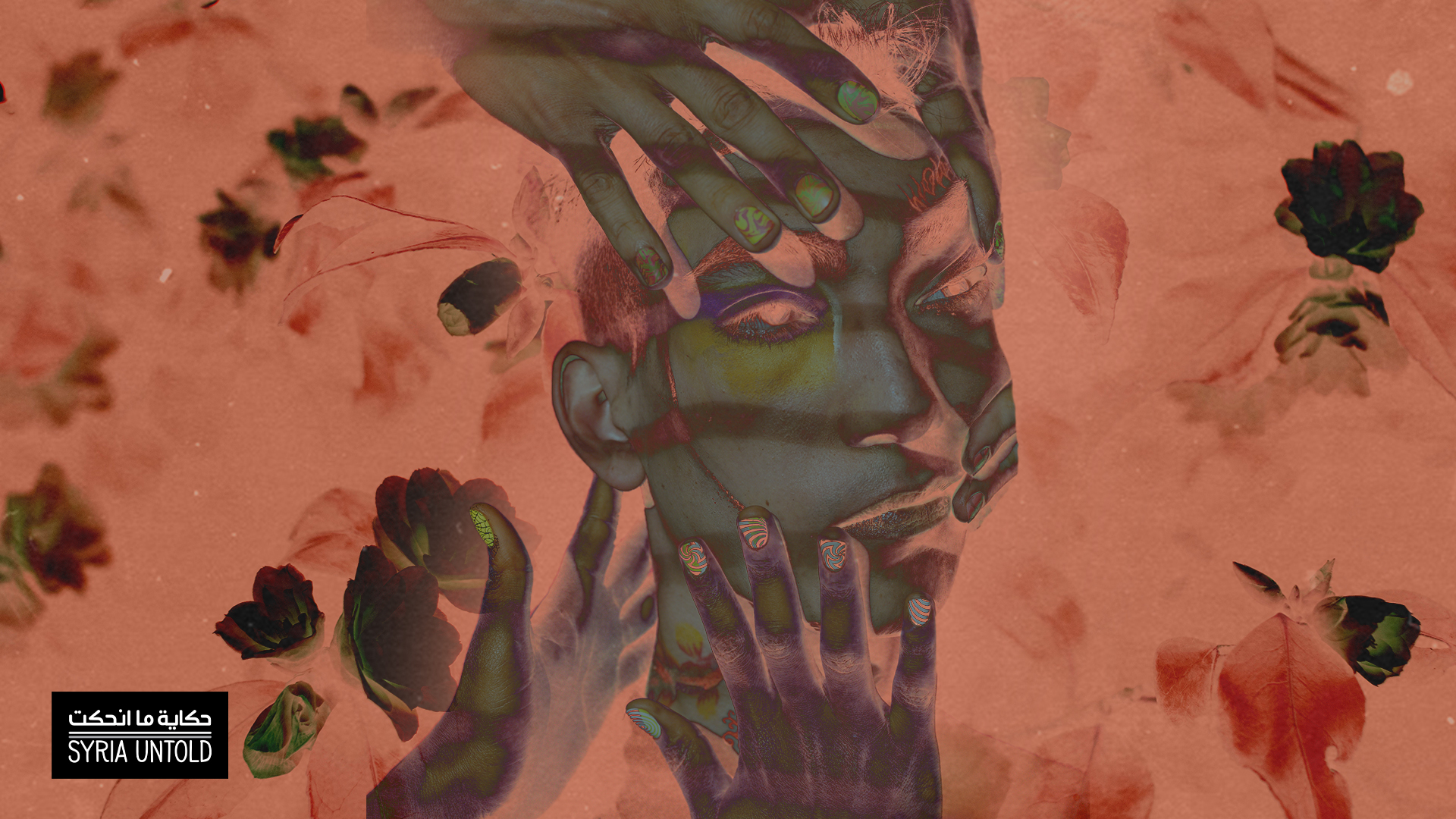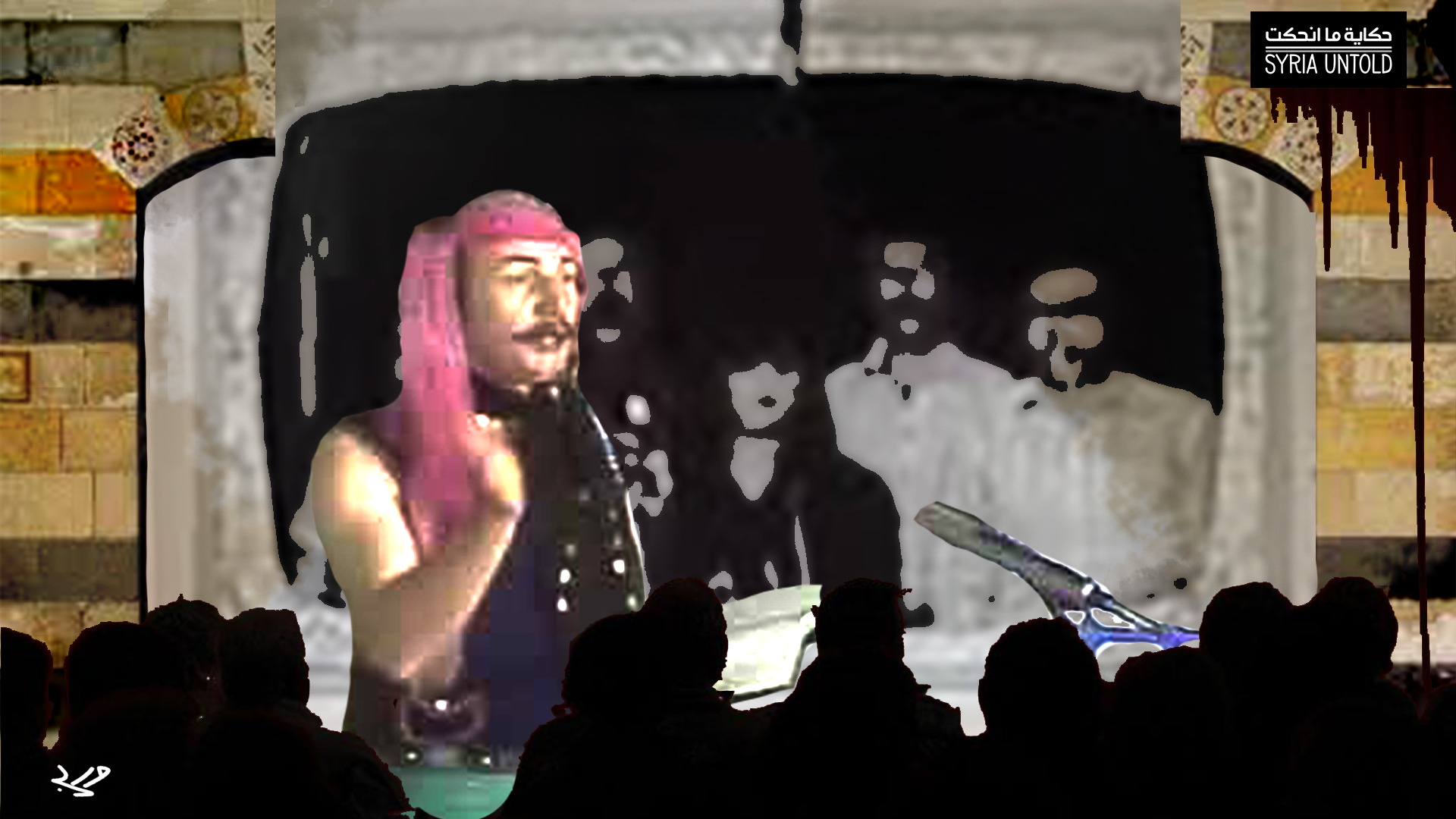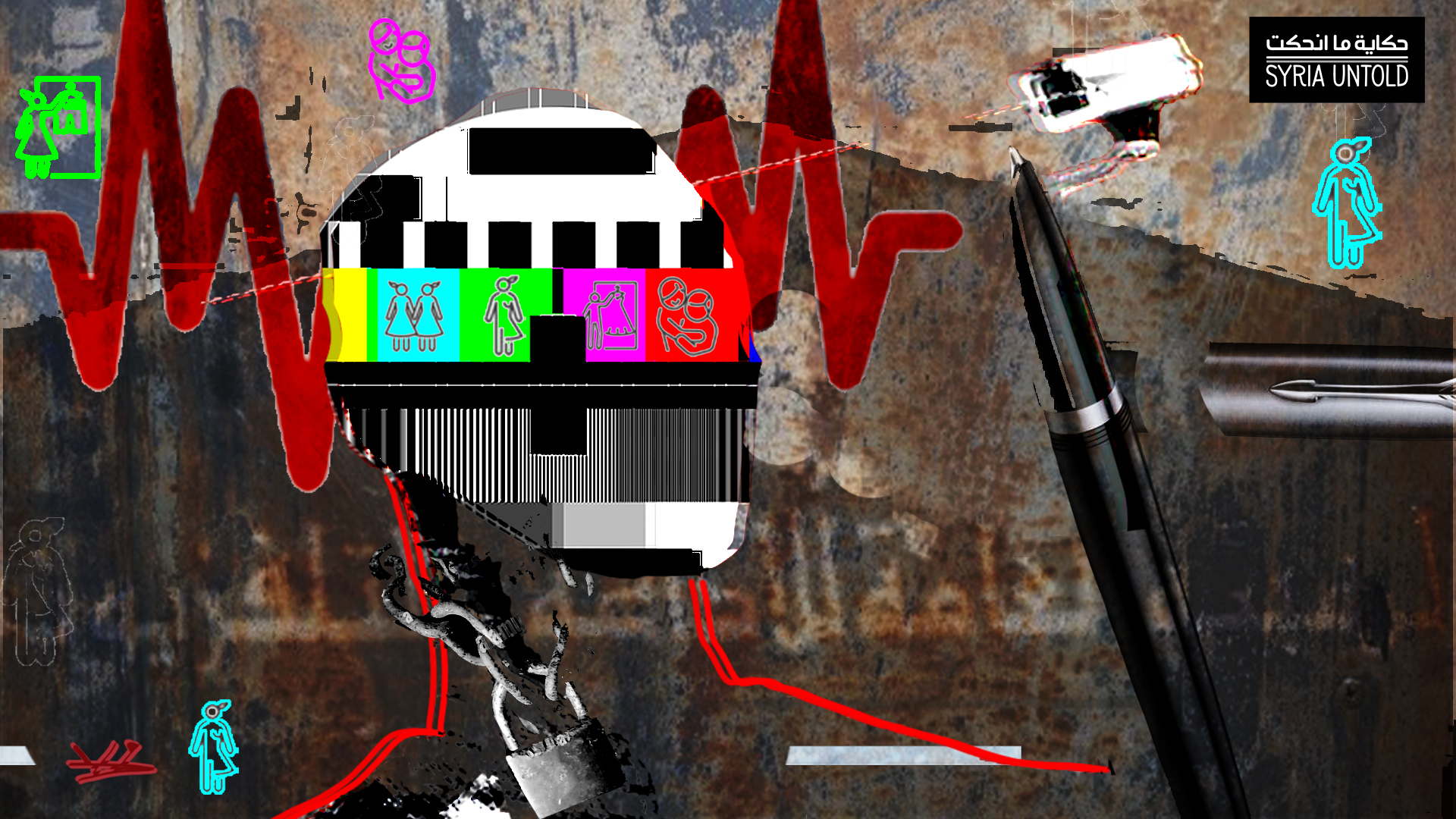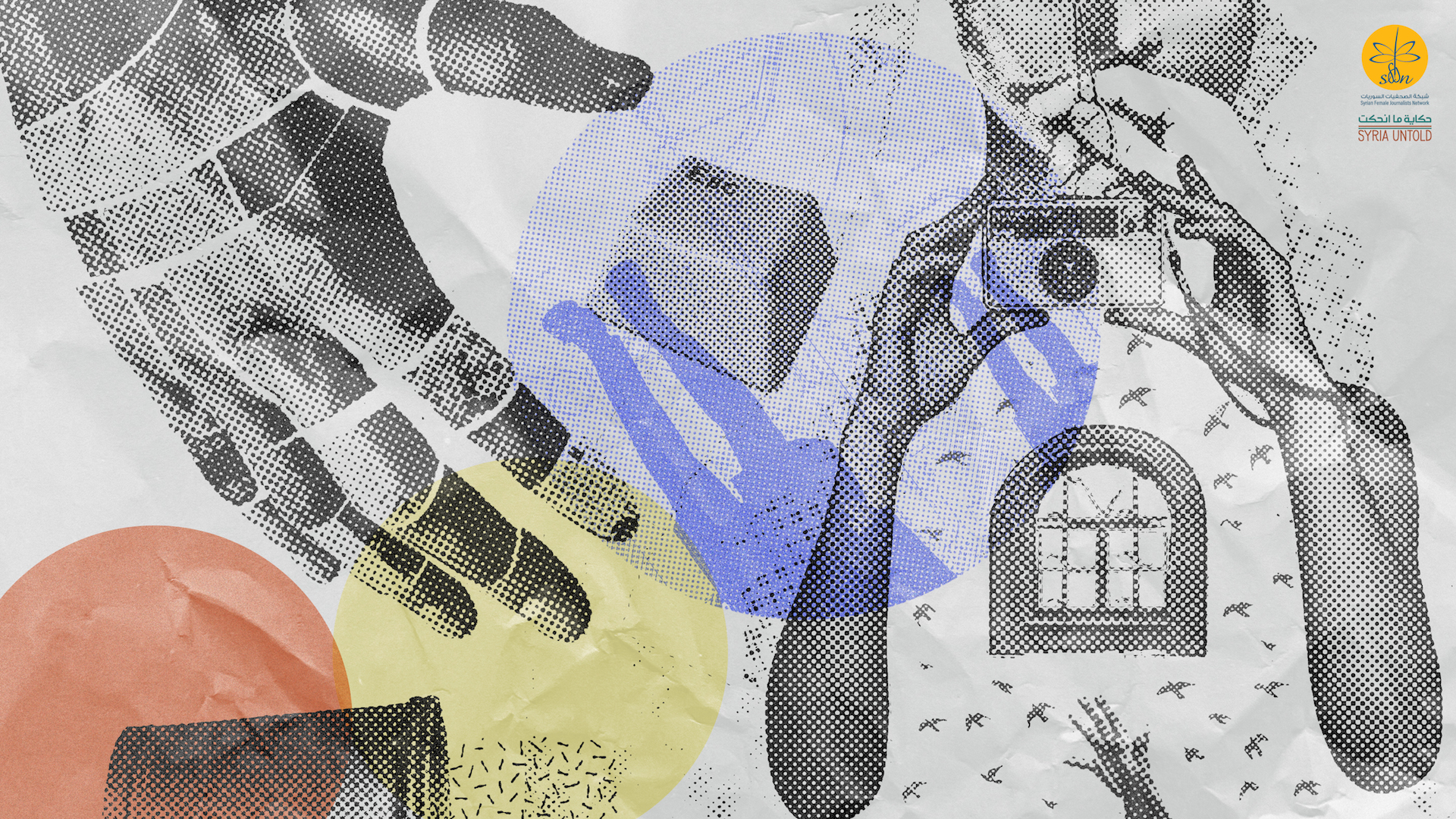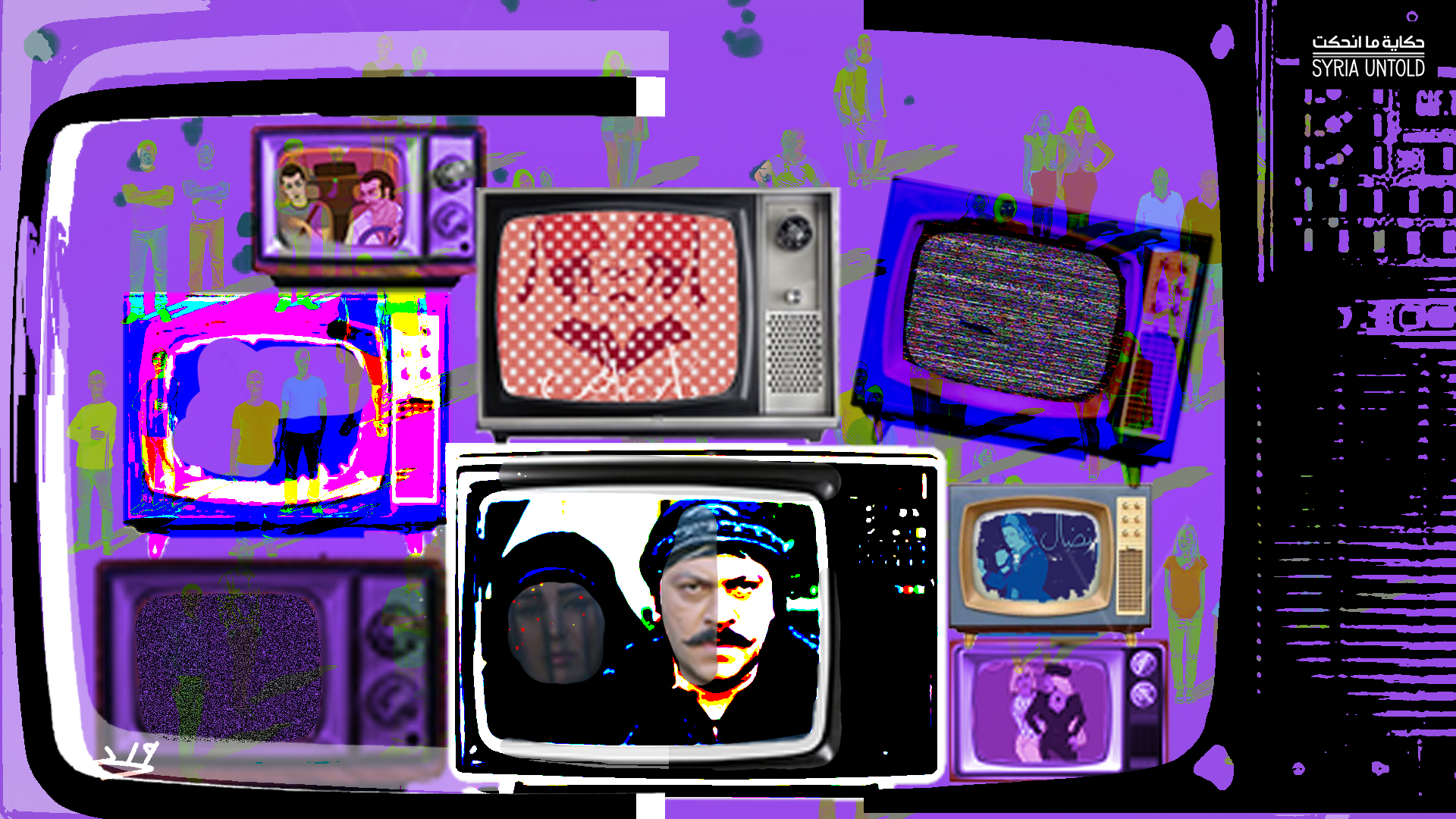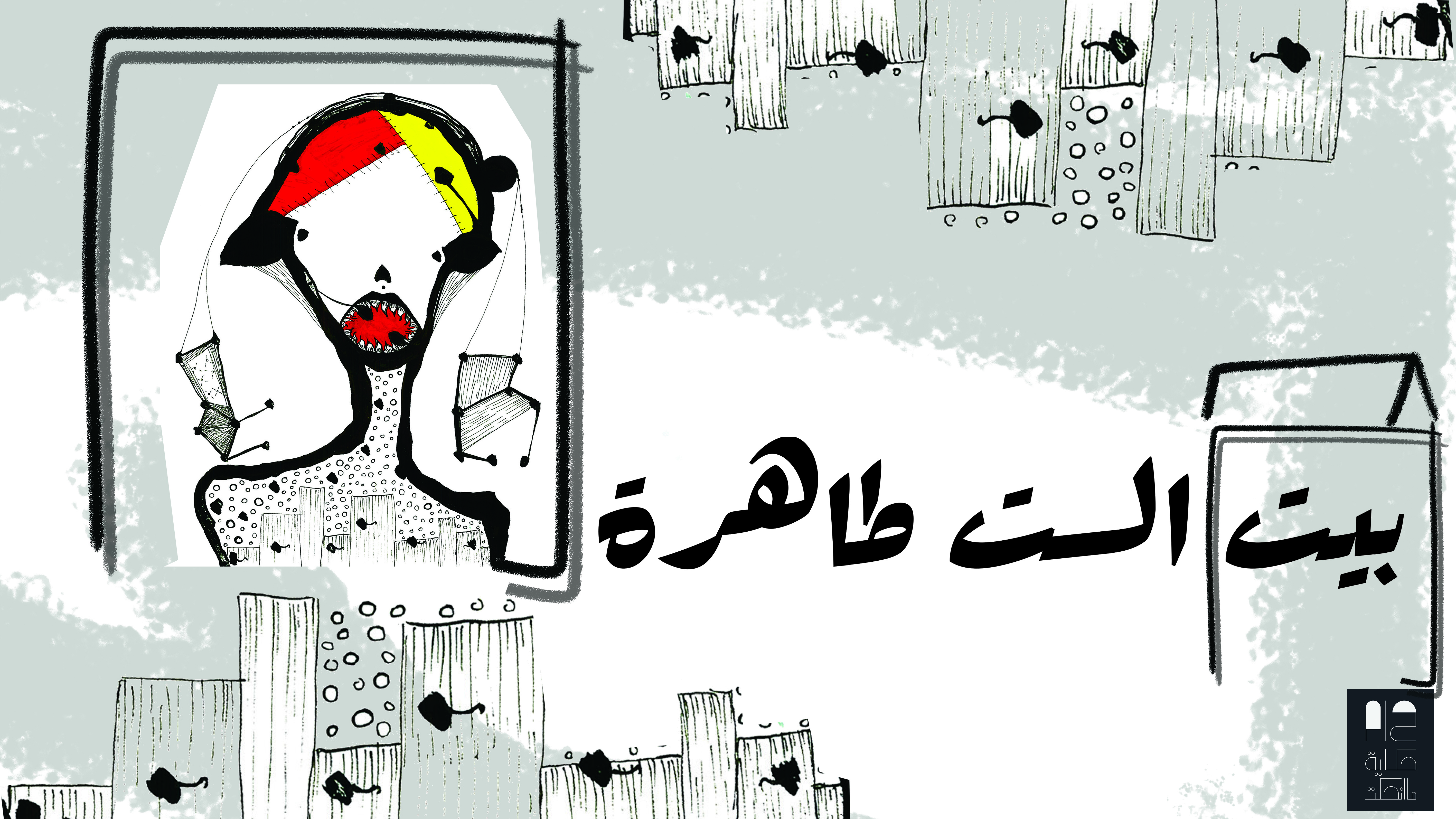This article is part of the "Queer Voices" dossier, edited and supervised by guest editor Fadi Saleh.
Jean Genet remembers Damascus with true melancholy, and a special nostalgia for his first love to a certain Seen (1) he met while doing his military service for the French authorities in Syria during the late twenties (2). This relationship was not a secret to anyone (3), but rather granted him the trust of Damascenes who would take him to witness to the destruction left by airstrikes (4) on the historical parts of the city.
Genet would return to Syria in the early seventies, at the beginning of his interest in the Palestinian resistance. By then, he had become well known in the Syrian cultural milieu, especially with the reviews circulating about the book by the French philosopher Jean-Paul Sartre, "Saint Jean, Actor and Martyr." Genet met Saadallah Wannous at the Semiramis Hotel, accompanied by the Syrian poet Ali Al-Jundi, who later narrated the details of the meeting in a text titled "He Spoke as if Praying (5)."
Syrian writer and translator Ghazi Abu Aqel, one of Genet’s friends in Damascus, tells us that the latter came to Damascus and left without the press knowing, except for al-Kalb, a journal read only by its editor and his friends. At the time, Sidqi Ismail, head of the Arab Writers Union, was the journal’s creator, author, editor and distributor. He published an article denouncing and satirizing Genet, who refused to visit the Union and ridiculed the idea of a writers' union (6).
Jean Genet's sexual adventures and successive series of scandals preceded him to Damascus. We know from Ali al-Jundi's testimony that the appeal of Genet’s personal life exceeded that of his literary work, which people were exposed to, without much interest, in the context of their university studies in Damascus at the time (7).
Jean Genet and Saadallah Wannous met at Samiramis Hotel, "Is this your leftist values?" asked Genet as soon as he entered, pointing to the table adorned with Syrian arak and mezze with its typical multitude of dishes. According to Ali Al Jundi, Wannous retorted by asking: “Is it true that you are homosexual?” for the second time, to which Genet responded: "Don’t worry, I’m impotent at this age (8)."
After many years of these meetings in Damascus and Paris, homosexuality would gain public visibility in the theater productions of Wannous notably in the play titled ‘The Ritual of Signs and Transformations.’
After many years of these meetings in Damascus and Paris, homosexuality would gain public visibility in the theater productions of Wannous notably in the play titled ‘The Ritual of Signs and Transformations.’ Published by Dar al-Adab in Beirut in 1994, within an exceptional queer space in the history annales of contemporary Syrian theater (9).
In this article, we interrogate queer vocabulary and symbols, analyzing queer characters and what they contextually represent. Additionally, our exploration encompasses the intersection of politics and sexuality, aiming to comprehend the intricate structure of the chaos generative system depicted in the text.
Set against the backdrop of events unfolding in the city of Damascus in the late nineteenth century, this narrative is an adaptation of an incident recounted by Fakhri Al-Baroudi in the first part of his memoirs. The account draws from the words of sheikh Hassan Al-Nahhas in his work titled “Solidarity of the People of Damascus.” The incident took place during the tenure of the Ottoman governor Mehmet Rashid Pasha, spanning the years 1866 to 1871.
The narrative of Al-Baroudi concludes in his memoirs with the unexpected alliance between the Mufti of Damascus and the leader of the notables. This alliance was forged when the notables' leader was apprehended, along with his mistress, by the commander of general security in an orchard. Despite their long standing animosity, the Mufti strategically intervened, deftly manipulating the narrative and the story by substituting the mistress with the leader's wife. Al-Baroudi suggests that the Mufti's motivation stems from his contempt for the commander, whom he perceives as neglectful of duty and religious principles.
We encounter an alternative interpretation of the personal motivations of the theatrical Mufti through Saadallah Wannous, who positions him in a role that offers a more profound insight into the narrative. The tale transcends the notion of solidarity among the people of Damascus; instead, it unveils a poignant struggle for power, entangled in the complexities of a foreign occupation and the societal divisions imposed by the regime's approach.
In the preface, the author explicitly states that authenticity regarding the social and historical realities of the era wasn't a primary goal. However, it's crucial to recognize the significance of the time depicted in the narrative. This period holds key importance in Syria's political history, marked by the establishment of the first Syrian parliament in Beirut (10) by what was then known as the 'Council of Syria.' It unfolded during years rife with rebellions against conscription into the Ottoman occupation army in regions like Latakia and Hauran.
The Politics of Passion
In Syria, a prevalent custom of "don’t ask, don’t tell" (11) exists, permitting prohibitions as long as they are kept discreet, avoiding public exposure. While the distinctions between what is permitted and forbidden may differ across sects, races, and environments, the overarching cultural trend involves concealing such matters. This pervasive concealment pattern, deeply rooted in a synthesis of religious and political elements, serves the purpose of preserving the current social norms and safeguarding the interests of the authorities they represent.
Tante Semsim tant and chronic arousal syndrome:
Tante or tantoun, plural tantat and tanateen: A pejorative word in Syrian colloquial literally meaning effeminate, often used to describe homosexual men. Sometimes, with some confusion, it is also used to describe transgender women. The term is now used by some homosexual men to express their gender identity and sexual orientation. The word is probably borrowed from French and with the same pronunciation. Here we reclaim it from the repertoire of social stigma and place it in our queer liberation context.
Semsim, as a character, embodies the essence of feminine homosexuality and personifies the concept of tante. His movements are reminiscent of a dance, a quality akin to khoshog (12). Semsim, though transient, wields significant influence within the context. Living authentically without a facade, he exists in harmony with himself and his environment, defined primarily by his marginalized status. This position adheres to clear rules, with Semsim perceiving himself as others do – a symbol of society's sexual obsession, a constant target of humor, and subject to ridicule, often viewed as a sex doll. "Let's have a little fun," Abbas remarks to Afsa upon encountering Semsim.
Strategies for rebellion: A queer reading of the Syrian revolution
06 October 2020
The visibility of tantat presents a challenge for those concealing their homosexuality. The mere presence of these individuals acts as a mirror, reflecting back repressed, confusing, and often oppressive desires. In the play, Semsim puts Afsa in an uncomfortable position, compelling him to confront and disclose his own sexual orientation.
The social context in which Semsim navigates is fraught with challenges. He embodies the notion of unbridled passion, unrestrained lust as a defining aspect of his identity. Lust and seduction form tangible threads in Semsim's mindset and significance. However, despite the strength and visibility with which sexual desire asserts itself, it is often marginalized when divorced from the broader context of the marginalized and the marginal. Denied the right to be acknowledged and represented within mainstream society, it remains relegated to the fringes of self and existence.
Semsim's distinctive walk and feminine, playful demeanor do not escape attention; they leave an indelible mark on the fates of other characters. As the play progresses, the eruption of sexual upheaval, particularly with the character of Almasa, unleashes chaos. This places individuals like Semsim in peril, subjecting them to suspicion and accusations of contributing to perceived social degeneracy.
Semsim relies on sex work as his means of livelihood, a profession he deems a marketable trade. It appears that the exchange of scandals and anecdotes is a crucial aspect of the commercial presentation he conducts in the markets. After all, he proudly labels himself a "master of workmanship." Publicly, Semsim explains the stagnation of his business with a statement: "The thugs opened from behind and the notables from the front." This cryptic remark alludes to Almasa (or Mou’mina, the wife of the former leader of the notables and a woman from an aristocratic family), and Afsa, the former zkerte (thug), who are gearing up to enter the sex work industry.
When Hamid al-Ajlouni, a merchant associated with the Mufti, reprimands Semsim, the latter retorts, "Oh Hamid Effendi... You lack any redeeming qualities. Thank God for carrots; they're the only things keeping the peace in your family." A tante has a knack for undermining the virility of adversaries; those with frustrated sex lives often harbor grudges against anything deemed naughty and exciting. Men harbor envy towards tantat for the reflection of their own suppressed desires seen in the eyes of these individuals. There is a fear of what these men might bring back home and infect their marriages with—a malady taking the form of lewd images and fantasies that threaten to corrupt their otherwise pure marital relations.
The Batra Afsa and Sufi homosexuality
Batra and its plural forms batari or batrat constitute a cryptic term within the Syrian queer community, specifically known as the jaw. This unique lexicon is reserved for the community's internal use. Batra is employed exclusively to describe individuals with ambiguous gender identities, encompassing non-binary or non-normative individuals. While many homosexual cisgendered men reject the use of the term batra, considering it a stereotypical expectation imposing femininity or softness on homosexual men, here we employ it in its precise, non-binary context. This usage aids in navigating the complex gender identity that Afsa explores during his brief journey with coming out.
Afsa, a homosexual man, has long kept his sexual orientation private, maintaining an outward appearance that aligns with his male gender identity. In a symbolic act, he later relinquishes its quintessential local symbol, his mustaches, marking the culmination of his triumph over the fear of revealing the concealed aspect of his zkerte character. Constructing a dreamy revolution against societal norms. He fabricates his dreamy revolution against the social system based on the principle of secrecy, for which he refuses to be an informant and a revealer, as he put it.
Afsa, a homosexual man, has long kept his sexual orientation private, maintaining an outward appearance that aligns with his male gender identity. In a symbolic act, he later relinquishes its quintessential local symbol, his mustaches, marking the culmination of his triumph over the fear of revealing the concealed aspect of his zkerte character.
Afsa has an ambiguous relation to power. As a zkerte, he possesses the ability to conceal his sexual orientation in a society where homosexuality is associated with femininity. Consequently, the character of the zkerte becomes entwined in the dichotomy of submission and domination. When viewed through this lens, Afsa's situation evokes Mamdouh Adwan's analysis of the shabbih character and the broader concept of tashbih, from which the term shabbih (13) originates. Adwan, in his studies on violence within "The Animalization of the Human," outlines a structure for what he terms authoritarian thuggery—a hierarchical system that permeates practices in the creation of the shabbih within a tashbih society. Functioning through friction, the shabbih symbolizes an extension of the phallus of power.
Tantat and Batari exist beyond the confines of societal norms, legal boundaries, and conventional standards of social acceptance. They inherently stand as sworn adversaries to any oppressive regime, challenging the imposed constraints on human potential and defying historical models of collective punishment for disobedience. The perpetual sacrificial examples of obedience, they embody the resistance against suppressing desires and subduing passions. Technically, the act of stifling desires and dominating passions equates to confiscating the imagination. All self-proclaimed deities dictate an idealized cosmic order that is deemed irrevocable, yet it is inherently monotonous and devoid of value, much like their own sterile and uninspiring imaginations.
Abbas joyously and cheerfully recounts the transformation that took place in him, "I was given a pleasure that I had been looking for all my life. You don't know what you've done to me! It changed me, it profoundly changed me."
In the opening scene, we witnessed ‘Afsa presenting Abbas with a unique gift – his mustache, delicately wrapped in a silk handkerchief. "I thought I’d offer you my most cherished possession, the final attribute that sets me apart in the eyes of others," he explained. The mustache, an iconic symbol, holds significant cultural weight. Men across Syria pledge their commitment by pinching their mustaches between thumb and index. It serves as a representation of manly honor; in times of heated confrontation, an enraged man threatening to pluck his opponent's mustache implies a challenge to their honor, suggesting potential dishonor and shame.
Afsa resides at the core of these cultural nuances, benefiting from the privileges they bestow. The mustaches of zkerte are distinctive, serving as adornments and unique ornaments. A zkerte takes pride in styling his mustaches in a special manner, meticulously twisting them over and over to achieve pointed tips. Essentially, the mustaches come to resemble the shibriyya or the dagger carried on their waist. The erect quality intensifies in the mustaches of the zkerte, creating a sharpness akin to a pin, a symbol rich with significance in their own language.
The zkerte mask wasn't a random or burdensome accessory but rather a tool for personal enjoyment and inner pleasure. For Afsa, it culminated in the experience of a more exquisite and satisfying aspect of life, akin to savoring a long-awaited, delicious fruit. Although not a literal mask, as we shall see, it doesn't entirely align with his inner desires and fantasies. These latent aspects of his subconscious mind will surface following his sexual encounter with Abbas.
In a technical sense, Abbas grapples with an anticipated transformation in Afsa before the mustache scene. It's the moment when Afsa unveils his secret, and intentionally, Abbas intertwines masculine and feminine pronouns when addressing him.
Abbas: You are now my sweetheart, and I will put you in my eyes. Drink.
Afsa (sipping a heavy dose): These words hurt me.
Abbas: You exposed yourself to me like a wife would. There is no need to pretend modesty.
Afsa: (He holds Abbas's hand and kisses it) Don’t expose me, I beg you.
Abbas: (while putting his hand on his neck) Nonsense, what kind of a man would expose his wife?!
The high symbolic price of mustaches does not explain the motives of Afsa, as they seem compulsory, or at least in response to the new formulation of the old question: “How does the other see me?” When confronted by Abbas's disapproval, Afsa reveals, "I wanted to be more beautiful for you. I noticed that your passion was abating, and that you were moving away from me, and I was terribly frightened. And I thought... How can I please my love? How can I please him?". On the other hand, the act enters a decorative and seductive context: "I want you to want me, to find me beautiful and soft in your arms. Look... I plucked all my body hair. My legs, my hands. Every inch."
What should I look like? This fundamental issue for Afsa becomes: "I wanted you to know that I had converted, that I had the courage to announce my transformation, and to confront people with it. Tell me how you want me?"
A queer refugee in Neukölln
08 April 2022
The question is directed at the beloved, an idealized image held by Afsa and superficially represented by Abbas. "Don't kill me. I did this solely for you. In our society, it's akin to death or even worse." Afsa grapples with the conflict between his acknowledgment of reality and the constructed narrative he presents. He didn't undertake this transformation for Abbas but for his own profound self-connection, a magical fusion he experienced. He subjects himself to humiliation, pleading, gasping, and crying, all while engulfed in the flames of a false lover. Afsa's ultimate transgression, leading to his suicide, unfolds on the symbolic altar. If we re-examine his ritual of transformation, the true sin lies in offering a sacred sacrifice to a false lover, a transgression deemed fatally sinful. Passion, as we all know, is systematically associated with falsehood and deceit which, in Afsa’s eyes, are a condition for life: "This world is unjust, designed only for the false and the dishonest."
Taking one's own life, according to Albert Camus, is a form of admission: "It is the acknowledgment that life is either overwhelming or beyond comprehension (14)." Does ‘Afsa surpass this premise? He chooses suicide in a moment of complete awareness. He comprehends the societal structure and recognizes the demarcations between the center and the margins. By ending his own life, he resists a permanent transition into Semsim's world—a realm of disdain and disapproval. Or, perhaps, is this his ultimate self-confession? Embracing the death sentence as a just punishment for his perceived transgressions?
Afsa embarks on a mystical and masochistic experiment that involves other characters as participants. Afsa seeks union with himself, the Mufti aspires to unite with the devil, Almaza pursues union with nature, and Abdullah seeks union with God. The common threads in this transformative journey include necessary suffering, pain, and secret pleasure. Ultimately, each character desires to transition into a more complete version of themselves. However, only one among them is qualified for success—Abdallah, the possessed dervish touched by God, a figure resembling a divine presence.
Afsa immerses himself in the process of harmonizing the inner self with the outward persona, navigating the intersection of informant and a revealer in his expression. His revelations, however, lead him down a path of self-destruction. To lay oneself bare before others is a surrender of power, yet this act of disclosure and coming out invites profound insight and a deeper connection: "I've become akin to water in its clarity. Regardless of how you perceive me, I am undivided—my appearance mirrors my depth, and my depth is reflected in my appearance. It is this love that emboldens me both within myself and in the presence of others. It is the source of my courage and vitality."
Afsa's suicide serves as a symbolic execution, epitomized by his poignant statement:"I cannot retreat, and I cannot advance." Caught at the crossroads of two irreconcilable opposites, he finds himself in a position of desperate rebellion. No longer able to inhabit the persona of a zkerte, he also cannot endure a life marked by stigma and shame—more destructive than death itself, a fate he deems inevitable.
In his closing monologue, he reflects on the courage he summoned and the agonies he endured in the pursuit of self-reconciliation. "I cannot regret it," he declares, and his final portrait unfolds—tragic and poetic. Afsa, the romantic hero, finds a poignant harmony with the dramatic narrative of his life as the betrayed lover.
Should he have committed suicide?
In the weave of personality and the trajectory of significance, the counter-chaos orchestrated by the ruling regime, personified by the Turkish governor in the narrative, takes aim at the more vulnerable groups already situated outside the normative framework. Afsa's tragic suicide, Almaza’s murder, and the toppling of the shrines of the old world converge to usher in the new order envisioned by Afsa. It's a realm where survival is contingent upon a web of lies and deceit, as truth becomes an elusive commodity in this transformed landscape.
We may presume that the insight attained by Afsa and the inner reconciliation he painstakingly achieved are compelling enough to propel him towards confrontation. If we rule out suicide, the next logical step places him at the core of a formidable force opposing the future authority of Abbas.
Abbas as an Adiyye and Elastic Desire
Adiyye is a Syrian queer term. It encompasses a spectrum of masculine men who tend to exaggerate their roughness in both appearance and behavior. They are typically attracted to tantat and batari – young men who display characteristics of youth and masculinity. However, it's essential to note that the nature and psychological aspects of sexual attraction differ for each of these distinct identities.
Adiyye is a Syrian queer term. It encompasses a spectrum of masculine men who tend to exaggerate their roughness in both appearance and behavior. They are typically attracted to tantat and batari – young men who display characteristics of youth and masculinity.
Abbas embodies a form of masculine homosexuality. His sexuality is flexible and undisciplined, driven by a lust for control. Abbas craves strong men, and irreverent women in the social rather than religious sense. Sexual desire is always expressed through fear, acquiescence, control and shame.
Afsa's relationship with Abbas begins with the presence of Semsim and by chance. As Semsim happens to pass by while they’re having a drink. Abbas invites Semsim to join them. "No, that's not right. It's impure," objects Afsa. "What's the matter with you! Anyone listening would think our gathering is at the courtyard of the Kaaba. I want to mess with him a bit," he adds.
During their conversation, it's revealed that Semsim had previously been intimate with both men. Semsim characterizes Abbas's penis as a dagger, stating that "only a strike from your dagger can extinguish my fire." Conversely, when describing Afsa's penis, he likens it to a grain of rice. Amidst Afsa's astonishment and despite his threats, Semsim tells Abbas that Afsa desires from men what Abbas himself desires.
We see the table turned later, Abbas is not talking about love, but about tutelage. "If you are docile and good, I will be your tent." The tent here is the cover that obscures the inside. When Afsa exposed himself, he abandoned the safety of the tent and the reason for its existence. Afsa buries his head in Abbas's lap. "You will be as you are. You will no longer suffer," Abbas says as he leans towards him.
Abbas's flirtation with Semsim reveals a desire to celebrate virility and obscenity by emphasizing it—an aspect that Afsa initially failed to grasp. Abbas clarified his perception of his relationship with Afsa, stating: "What existed between us was a transient lust, subject to the dictates of time. It pleased me to mount a man who was considered as a zkerte, to see his proud back bend and diminish between my thighs."
Abbas's homosexuality manifests as virile, with a preference for rugged and assertive men. Sexual relations for him are akin to a transformative ritual, an act of self-love and appreciation for those similar to himself. We witness his immediate loss of desire upon seeing Afsa devoid of body hair, beard, and mustache. Abbas remarks: "What pleasure would I derive from embracing a slender, effeminate figure!"
Abbas's relationship with Semsim is a transient encounter, never repeated, distinct from his connection driven by virility with Afsa. Afsa captivates Abbas with his masculine attributes. We know Afsa is stronger through the scene where he tops Abbas in an arm-wrestling match. He is more audacious and reckless. He can match the offensive masculine impulse in Abbas. Afsa’s zkerte persona serves as a symbolic mask, his singular face; upon removing it, he becomes faceless, and his virility disintegrates into that of Abbas, forging a closer connection. "I can't bear you staying away from me," he declares. As Afsa sheds his skin, Abbas absorbs the last remnants of his untamed masculinity.
Abbas attains a newfound awareness regarding the significance of organizing thuggery during the regime's collapse to seize power. He metamorphoses into a system of chaos, where violence begets violence, and blood begets blood, and in this milieu, Abbas—the adept manipulator and forger—ascends as the godfather of the shabiha, dominating with unparalleled brutality.
Castration Policy
Authoritarian hegemony establishes a hierarchical chain of influence that extends not only over bodies but also over ideas, lifestyles, and expressions. The leader or commander holds the legitimacy to permeate bodies, or rather violate them. Bodies stand exposed before the might of power. The public nudity of military members exempts from the usual norms of decency. In this context, individuals lose their personal agency, becoming subsumed within the absolute authority of the leader.
The convergence of the sexual undertones within political acts goes beyond mere superficial masculine posturing in election campaigns, moralistic rhetoric embedded in speeches, or acts of violence in prisons and detention centers. It extends to a pervasive pattern or conduct that infiltrates the administrative machinery responsible for executing the authority's programs and vision. This behavior molds the overall societal and state atmosphere, evident in the arts and theories endorsed by the authority, as well as in architecture, social relations, education systems, health, and various other facets of society.
What is the style of the system of chaos in which people fall when they seek their freedom?
This leads us to think about the deep structure of the system that governs the conflicting forces in the text, in other words, what is the style of the system of chaos in which people fall when they seek their freedom? The play describes this collapse, where all individual choices outside the standard lead their owners to face a radical transformation, the problem is not in the inevitability and tragedy of these transformations, but in the emergence of a counter-regime that possesses the mentality of chaos and the rules of its management, as we can see in the very special dialogue between two zkerte characters who become shabbiha and central elements in the new system.
Every character responds to the shifts in their lives and surroundings, save for the eunuch, who remains untouched by any alteration. His presence is minimal in the text, he emerges fleetingly in just two scenes – the sixth scene of the first section, titled “Intrigues”, and the tenth scene of the second section, titled “Fates”. Paradoxically, his unassuming appearances belie the profound and inescapable influence he wields over the unfolding events.
During his initial appearance, he stood as the sole individual granted permission by the governor to visit the prison. His mission being to ascertain whether the woman confined with the leader of the notables was indeed his wife and not a mere mistress. Despite harboring skepticism regarding the mufti's narrative of the incident, the eunuch opted to withhold his reservations from the governor, deferring them to his subsequent appearance when he had a different purpose in mind.
Because of the eunuch's confirmation of the mufti's narrative, the commander of general security is imprisoned. This result is precisely the most valuable thing that can be achieved for the eunuch, only he remains an advisor and a counselor to the governor, the evidence provided is central in the plot and upon which everything related to the rest of the characters is built.
In the second scene, the governor grapples with the perplexing fatwa issued by the mufti, advocating capital punishment for both male and female prostitutes, burning non-religious books, banning singing and dancing, and urging Muslims to assault establishments making alcohol. Recognizing the peril it poses to the stability of his jurisdiction, the governor contemplates overturning the fatwa. Swiftly, the eunuch steps in, cautioning against such a move, emphasizing the potential backlash from the Muslim community. Instead, he skillfully persuades the governor to publicly commend the fatwa and defer its implementation until securing approval from the central government in Istanbul.
The complicity of the eunuch in the secret the first time plunged everyone into the maze of doubt, and his interference in the governor's decision caused the death of Almaza and the agitation of the city.
The legend of Zuzu
05 June 2023
The governor, addressing the eunuch, remarked: "I must admit, I lack your unyielding composure and sharp clarity of mind. It almost makes me envy you for being castrated. Amidst this chaos, you stand as the singular figure undisturbed and assured."
The governor expresses his apprehension to the eunuch regarding Almasa's safety. The eunuch assures him that no harm will befall her if he aligns himself with the fatwa. Almaza is soon murdered without any form of protection.
The fatwa distinctly aims at extinguishing expressions of joy and play, annihilating adornments, and obstructing sources of joy. The eunuch emerges as an adversary to pleasure, recognizing the chance to quash passions and seizing them with unwavering resolve. This position encapsulates the essence of the system—inherently impotent and infertile. Incapable of contributing constructively to the social fabric, it perpetually relies on displays of power and tyranny. In its dominion over the tangible, it strives to reclaim lost fertility, devouring or assimilating it. Violation becomes the sustenance ensuring its survival.
The castration structure finds its roots in the historical dynamics of the regime, functioning as a surrogate authority. In Damascus, the governor, serving as the local ruler by proxy to an occupying government. He derives his power from an external force, thus establishing a castration exchange system. In this paradigm, everyone becomes figuratively castrated, and the true sovereign is the eunuch. This impact reverberates through the characters' relationships and life trajectories, where a crucial missing or lost element becomes the focal point, evoking intense reactions. The Sufi language delicately sublimates this absence through sadistic and masochistic expressions, leading us toward a divine interpretation of the elusive element. The word of Abdallah, the leader of the notables, offers a glimpse into this mystique: "I have matured. Your light blinds me. I am melting like a slender candle, and I fade in you... I perish, I perish," shedding light on the solution to this troubling mystery.
The Queerness of the last days and the interpretation of disintegration
The text constructs a narrative portraying the disintegration of a social and political system. It draws upon earlier references that point to the system's deterioration, emphasizing the corruption of power and the detachment of its symbols from the common good. The overall tone of the text is pessimistic, underscoring the emergence of a counter-system marked by an understanding of chaotic principles and mastery of domination through repression and intimidation. This counter-system advocates for the perpetuation of the existing symbolic structures but strategically drains them of their impact and efficacy in the decision-making process.
Regarding the queer presence in the narrative, it's worth highlighting the distinctiveness of this representation within the context of Syrian theater. The queer character is portrayed with a voice, engages in interactions, and possesses a distinctive set of characteristics and a unique world. However, it is essential to note certain problematic aspects inherent in this representation, notably:
(1) The oral Islamic tradition often weaves a narrative thread associating queer manifestations with the culmination of time or the apocalypse. In this context, the phenomena signaling the end or the onset of the end include concepts of gender transition, serving as symbolic markers or signs. This recurrent pattern aligns seamlessly with the dramatic evolution of the characters, shaping their destinies within the narrative. Such themes tend to flourish particularly during times of war and upheaval, providing convenient tools for the manipulation of policies or the veiling of certain issues. The potency and contentious nature of gender nonconformity play a significant role in influencing public perception.
(2) Afsa's narrative unfolds with a tragic, romantic dimension mirroring the journeys of Almaza and other central characters undergoing extraordinary transformations. Drawing inspiration from Afsa's character, a fresh comprehension of self and society takes shape, leading to a profound stance on life. However, this exploration culminates in Afsa's decision to take his own life. Upon scrutinizing the text's structure, it becomes apparent that the character's demise is integral to the overarching plan. To consider the survival of Afsa would necessitate a pivotal alteration in the narrative's essence or its prospective outlook. Later scenes depicting interactions between Afsa and Abbas reveal his formidable strength and his ability to win. Abbas is the embodiment of a new order rooted in chaos. Hence, if Afsa were to survive, it would signify not only a divergence from the intended course of the narrative but also hold the promise of resistance and the potential for the poetic essence of rebellion to flourish.
(3) The play introduces the character of Semsim, embodying a tante in society within a conventionally negative framework. His presence serves solely as a harbinger of chaos within the dramatic context. It offers no space for the exploration of his backstory. The text compels us to perceive Semsim as he stands, devoid of any emphasis on the character's values or distinct emotions. Instead, it paints a picture of him marked by sexual frenzy and a subservience confined to the fringes where sinners and outcasts linger.
We must not demand of a play to offer what it inherently cannot provide; its characters exist as symbolic representations. Nevertheless, we bring attention to these issues to underscore that individuals, and the unfolding of their personal narratives, constitute a tapestry of interconnected events spanning past and present. The act of listening to or witnessing their representation on stage is akin to indulging in a poetic exploration of their intricacies, nuances, emotions, imaginations, and ideas. For the Syrian queer community, there exists a profound level of poetry and tragedy interwoven with the life stories of many, especially those marginalized individuals known as tantat. These narratives resonate deeply within our collective consciousness, serving as a testament to the resilience and complexity of human experience amidst societal challenges.
Footnotes:
(1) Seen: A word from Syrian queer lingo meaning a beautiful young man.
(2) Jean Genet, Prisoner of Love, translation: Kazem Jihad, published by Dar Sharqiyat, Cairo, 1st Edition, pp. 373-374. “At eighteen, amidst the throes of the Druze uprising in Damascus, I found myself in a city laid waste by the hands of the French forces. The devastation, while not unexpected given my recent induction into the army, lent an air of strangeness and perhaps exacerbation to the surroundings. It marked the first occasion in my life witnessing a city held captive by the hands of young soldiers. Damascus, during this time, embodied a paradox of strangeness, freedom, and military presence, shaping my perception of the city. The journey from Beirut to Damascus by train held its own mystique. The narrative takes a poetic turn as I recall a saying attributed to the Prophet shortly before entering Damascus: "I will not enter Damascus because paradise cannot be entered twice." The scenery unfolds, revealing the Barada River, its waters dammed by the Romans, coursing through this paradisiacal landscape on four, sometimes five, different levels. Apricot trees adorned the right side…”
(3) Ramses Awad, Rubaiyat al-Shouzouz wal Ibdaa, Sina and the Arab Diffusion Foundation, Cairo, 1st Edition, 1998, p. 28.
(4) Between 18 and 20 October 1925, the shelling destroyed residential neighborhoods such as Sidi Amoud and the Jazmatiya area in the square, burned part of the Hamidiya market, and destroyed large parts of the Bzouriyeh market, including the famous Al-Azm Palace where the rebels had staged.
(5) Jean Genet Poetry of Rebellion, published by Dar Canaan, Damascus, 1st Edition, 1998, He Spoke as if Praying, pp. 291-294. The Arabic title of the text was translated into English by the translator.
(6) Sidqi Ismail opened his article with an attack on Ali Al-Jundi because he told him that Genet will visit the Union and many great names of that period came to meet him such as Anton Makdissi and Adib Lajmi and others, Ismail says:
You promise as whores promise Oh Ali Al-jundi you are a scoundrel
How dare you invite writers for someone Whose name invites abominations?
He is a thief and a criminal and a fool A perfect peer for someone like yourself
A prostitute he is of him all is said And what is said is never answered
(7) The Poetry of Rebellion, p. 291.
(8) The Poetry of Rebellion, p. 292.
(9) We use the term queer to denote everything that does not conform to the normative system, and it is common to use an atypical expression as a semi-literal translation of the theory, which is an acceptable linguistic approach, but it is closer to our queer concept to use the word wonderful, which is outside the context of reality and the familiar and is not synonymous with the stranger either. The word is used in different forms in colloquial dialects (wonder, wonder, wonder) to describe respectively either a miraculous event associated with the world of the unseen, or unfamiliar or repulsive human bodies, or to calibrate with a behavioral or intellectual difference.
(10) The Council comprised 32 elected members, and held its first session in December 1876 in Beirut under the chairmanship of Mehmet Rashid Pasha, https://beirutheritage.org/?p=3647
(11) The popular saying, "If you are afflicted with sins, hide yourself" translates the direct meaning of this pattern, which is similar to the principle of decency in neoclassicism where the general social norm determines what is appropriate and what is not.
(12) Khoshog: A Syrian queer word which means walking with some seduction, making sure to shake the buttocks harmoniously during movement.
(13) Shabbih can be translated to thug as well but carries more of an organized street mob. The term in Syria is often associated with political para-military practices used by the regime to terrorise the population and discourage dissent.
(14) Albert Camus, The Myth of Sisyphus, translation: Anis Zaki Hassan, Al-Hayat Library Publishing, Beirut, 1983, p. 14. The translation is made by the translator.




